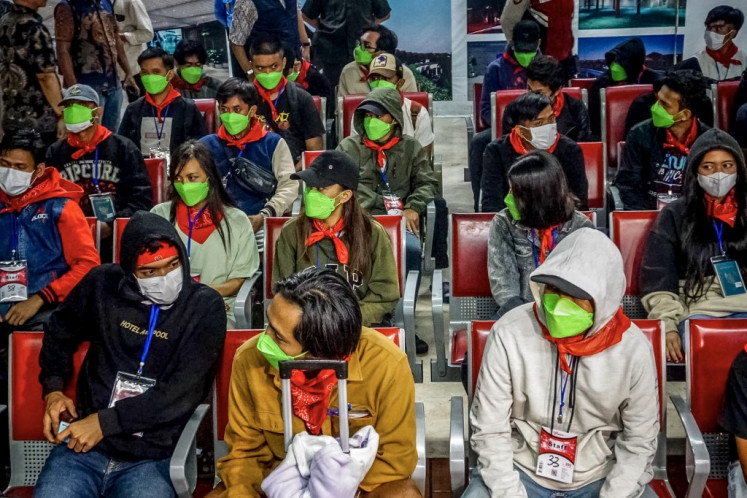Popular Reads
Top Results
Can't find what you're looking for?
View all search resultsPopular Reads
Top Results
Can't find what you're looking for?
View all search resultsTask force told to help migrant workers
President Susilo Bambang Yudhoyono has instructed the task force on Indonesian migrant workers to focus on and help workers facing the death penalty overseas
Change text size
Gift Premium Articles
to Anyone
P
resident Susilo Bambang Yudhoyono has instructed the task force on Indonesian migrant workers to focus on and help workers facing the death penalty overseas.
The President’s instruction was outlined in a presidential decree signed on Feb. 24, according to a statement by the Cabinet secretary released on Wednesday.
In the decree, the President also specifically instructs the task force to provide maximum legal assistance to any Indonesian expatriate charged with crimes that carry the death sentence.
Giving legal assistance was previously the duty of Indonesian Embassies. The task force has offered help in collecting information and supervising the legal proceedings.
According to the statement, the President has also assigned new members to the task force to strengthen it. They include former deputy attorney general Muchtar Arifin, former Indonesian ambassador to Morocco Syachwien Adenan and former ambassador to Syria Muzamil Basyuni.
Former religious affairs minister Maftuh Basyuni still has the mandate to continue his leadership of the task force. A number of prominent figures, such as former attorney general Hendarman Soepandji and Religious Affairs Deputy Minister Nazaruddin Umar, however, are no longer on the team after the issuance of the presidential decree.
The task force was set up in July last year amid public outcry over the lack of legal assistance extended to Indonesian workers with legal problems in Saudi Arabia.
Earlier this year, President Yudhoyono extended the task force’s tenure for six months until July.
Meanwhile, the government says that some embassies in Jakarta are reportedly issuing visas to Indonesian job seekers despite its moratorium on sending Indonesians to work overseas.
“We are studying reports that foreign embassies have issued working visas to Indonesians while, in fact, we are still implementing a moratorium,” said Tatang Budie Razak, director of Indonesian citizen protection at the Foreign Ministry on Wednesday.
As of late 2011, the Indonesian government maintained moratoriums on sending migrant workers to Saudi Arabia, Syria, Kuwait and Jordan.
The moratoriums were triggered by numerous abuse cases of Indonesian workers.
A moratorium on sending workers to Malaysia was rescinded after the Malaysian government promised to improve the prosperity and safety of Indonesian workers in the neighboring country.
Tatang said that the embassies of Saudi Arabia, Syria, Kuwait and Jordan would violate Indonesian law if they continued to issue working visas despite the moratorium, likening the process to human trafficking.
“The recruitment and placement of Indonesian workers overseas must be made through an accountable process that includes a training, a medical check up and providing the workers with insurance,” he said as quoted by Antara.
He said officials would monitor the embassies for their compliance.
“We will take strong measures if we find one. We are still studying this,” he said, adding that the Foreign Ministry would summon representatives of the embassies to clarify the reports.
—JP/ Bagus BT Saragih










